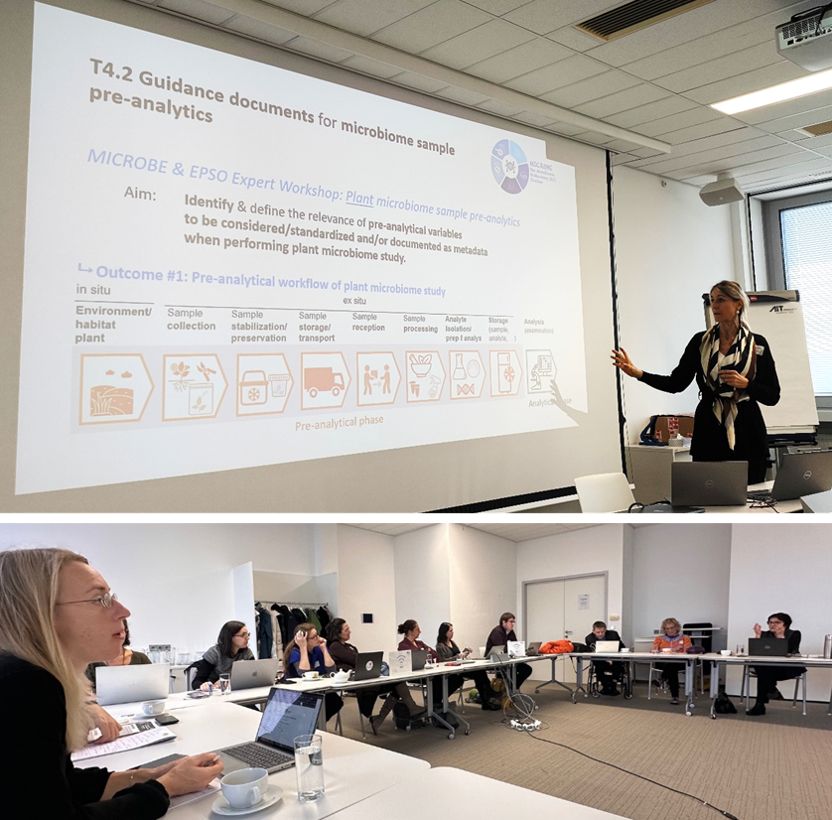MICROBES-4-CLIMATE: Preanalytical standards as key to microbiome and climate research
Recently, an insightful Bioethics and Regulatory Workshop of the EU project MICROBES-4-CLIMATE was held in Vienna. In addition to adressing legal and ethical issues, the workshop highlighted the importance of the pre-analytical phase in both environmental and human microbiome research.
MICROBES-4-CLIMATE's Bioethics and Regulatory Workshop
November 25-27, 2024, the EU project MICROBES-4-CLIMATE organized a Bioethics and Regulatory Workshop in Vienna, Austria. The workshop aimed to discuss and showcase which bioethics and regulatory frameworks are relevant to the analysis of the complex interplay between microorganisms, plants, and soil within the context of climate change. As part of this workshop, Cornelia Stumptner (Med Uni Graz, BBMRI.at executive manager, and lead of the WP Standardization & Quality Control in the EU project MICROBE) presented the central importance of the pre-analytical phase and of CEN and ISO standards which exist in the field of human research. The projects MICROBE, MICROBES-4-CLIMATE, and BBMRI.at show substantial synergies that are being exploited.
Pre-analytical phase and of CEN and ISO standards
The pre-analytical phase includes all steps from sample collection, preservation, and transportation to processing and storage. This phase is of particular importance, as many variables exist in this phase that can negatively impact results of analytical tests and studies because it can artificially modify biological samples. This also accounts for microbiome samples such as stool, salvia, throat or genital swabs, but also for environmental soil, water or plant microbiome samples.
For the human field ISO and CEN standards for the preanalytical (i.e. pre-examination) phase exist for tissues, blood, salvia, urine samples for RNA, DNA, or protein analysis, as well as for human samples intended for microbiome DNA analysis. Many of these standards were generated in the context of the EU project SPIDIA4P where BBMRI.at members (e.g. Cornelia Stumptner and Kurt Zatloukal) contributed.
Compliance with ISO and CEN standards ensures that good scientific practice is adhered to – an essential factor for accredited laboratories as well as for basic and transnational research.
In the workshop Cornelia Stumptner emphasized the important work of the SPIDIA4P, BBMRI.at and MICROBE projects, in which she played a key role. These initiatives illustrate significant synergies that underline the importance of further developing standardized processes.
About the EU projects MICROBES-4-CLIMATE and MICROBE
MICROBES-4-CLIMATE aims to deepen the comprehension of the complex relationships between microorganisms, plants, and soil within the framework of climate change. The project offers microbial services addressing climate change risks for biodiversity and for agricultural and forestry ecosystems in order to enable research and advance frontier knowledge. It provides access to advanced research infrastructures, training, and support, to tackle the multifaceted challenges facing terrestrial biodiversity and ecosystems.
MICROBE (i.e. Microbiome Biobanking (RI) Enabler) envisions to pave the way for an innovative microbiome biobanking in Europe by combining scientific expertise with research infrastructures know-how. It works on the development of technologies, data infrastructures, standardization and ethical and legal guidelines for the biobanking of microbiome samples. The goal is to establish an operational framework for microbiome biobanking in an effort to advance microbiome research and strengthen the One Health approach.


